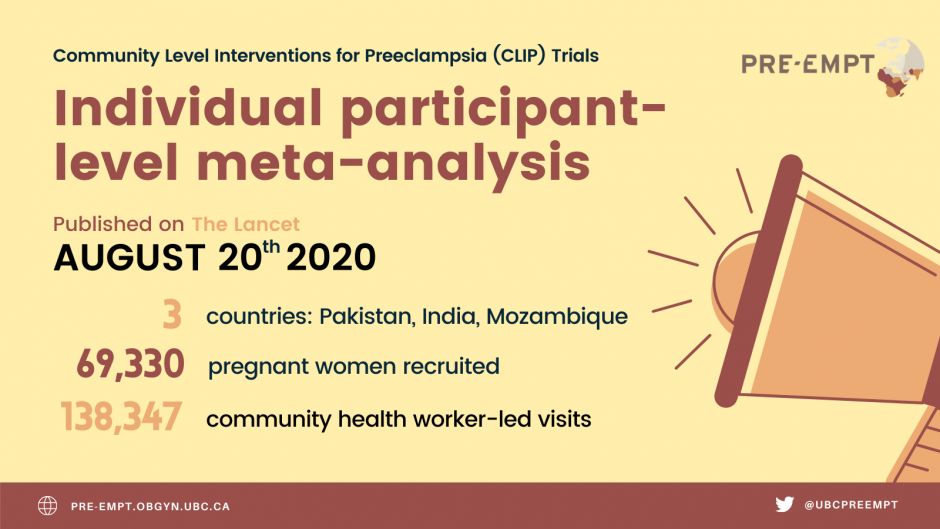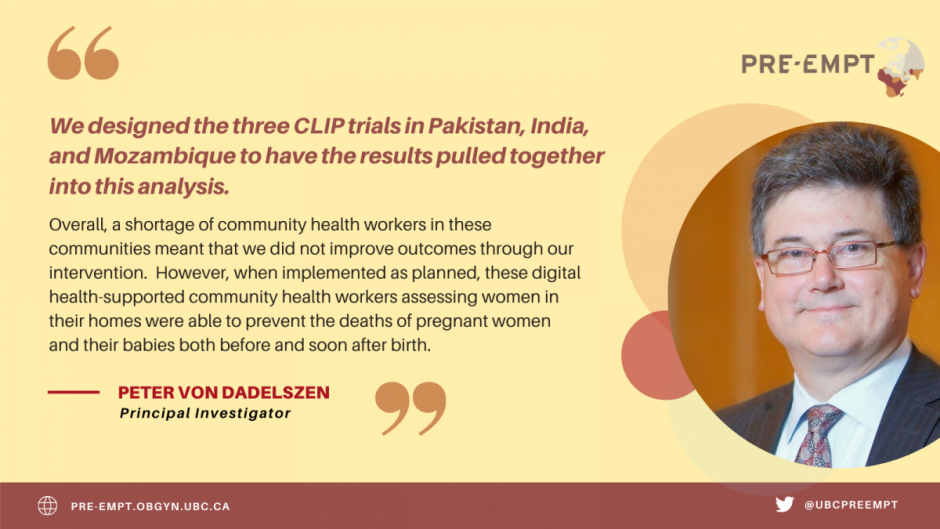
Meta-analysis of three studies, published today in the Lancet, recommends adequate numbers of well-trained community health workers and standardised healthcare systems to reduce the number of maternal, newborn and foetal deaths.
The Community Level Interventions for Preeclampsia (CLIP) Trials examined the outcomes of 70,000 women in Mozambique, Pakistan and India between 2014-7. The study aimed to reduce deaths associated with pre-eclampsia. Pre-eclampsia is a condition that causes high blood pressure during pregnancy and after labour. Globally, pre-eclampsia is the second leading cause of maternal mortality, with 76,000 maternal deaths and 500,000 foetal and newborn deaths every year worldwide. Delays in triage, transport to healthcare facilities and treatment contribute to the high numbers of deaths among mothers and infants.
The trials divided women between control and intervention groups. Control groups continued with their local standard of care, whereas intervention groups had access to community health workers who could detect, treat, and refer to hospital women with hypertension, a symptom of pre-eclampsia. Women were also taught how to recognise problems during pregnancy and health workers had access to an app that could help determine the risk to patients and blood pressure and blood oxygen devices so that they could assess women in their homes.
The analysis shows that when there were enough community health workers to provide care there were fewer deaths of mothers, fewer stillbirths and fewer deaths of newborns. However, when there were not enough community health workers, there was no impact.
Researchers recommended expanding the community health worker workforce so individual women were in contact with care providers at least eight times in each pregnancy, and to improve standards of healthcare systems.
Professor Peter von Dadelszen, from King’s College London, the principal investigator of the multi-country study said: “We designed the three CLIP trials in Pakistan, India, and Mozambique to have the results pulled together into this analysis. Previously, most efforts had focussed on hospital-based care and we moved the focus to the care of pregnant women in their communities, with that care being given by community health workers. Overall, a shortage of community health workers in these communities meant that we did not improve outcomes through our intervention. However, when implemented as planned, these digital health-supported community health workers assessing women in their homes were able to prevent the deaths of pregnant women and their babies both before and soon after birth.”

Prof Zulfiqar A Bhutta, the senior author of the Pakistan arm of the study and co-investigator of the CLIP trial stated “the findings of the CLIP Pakistan study once again reinforced the need to work on multiple fronts to address the burden of maternal and newborn mortality. More recent data indicate that a quarter of all maternal deaths in Pakistan are related to high blood pressure in pregnancy. Addressing this challenge through well trained LHWs linked to quality care in our referral facilities is critically important in our quest to reduce preventable maternal and newborn deaths”
Fresh off the press, you can read the CLIP Individual Paricipant-level Meta Analysis paper here: http://ow.ly/KHHs50B53qK
You can also find the country specific papers here:
CLIP Mozambique: https://www.sciencedirect.com/science/article/pii/S2210778920300684?via%…
CLIP India: https://www.sciencedirect.com/science/article/pii/S2210778920300696
CLIP Pakistan: https://www.sciencedirect.com/science/article/pii/S2210778920301008
For more information about our findings and to stay up to date with our other projects and publications, follow us on Twitter @UBCPREEMPT